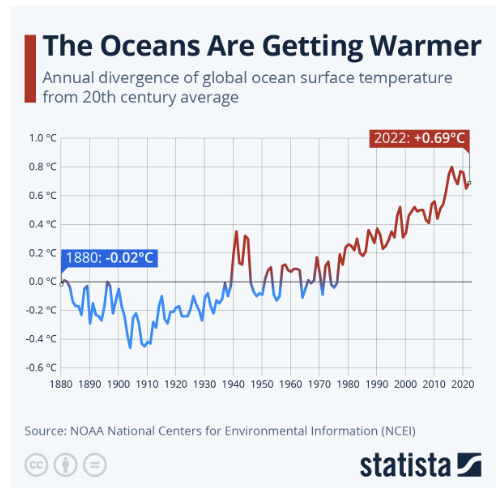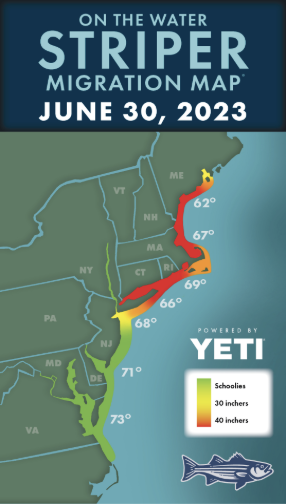It is no secret that oceans are warming at an alarming rate in recent decades, and there are efforts being made to combat that. While focusing on water temps rising and what we can do to slow that, what about the species that call the ocean home? Many if not all oceanic species are influenced or even dependent on temperature. While every species is certainly different, it would be easy to assume that these species would have some sort of reaction to rising water temps. For example, maybe a fish would change its diet due to a change in availability of its preferred prey due to temperature changes, maybe a migratory species would change its migratory patterns, and maybe a fish species would spawn in a different location or at a different time of year due to a change in climate. All of this is very important to recognize, because not only are there many stakeholders in certain fisheries, but we also need to know when to protect certain species at certain times when they may be most vulnerable (i.e. during spawn). One intriguing species in particular is the Striped bass (Morone Saxatilis).
2022 was an alarming year for temperature. Earth’s average land and ocean surface temperature in 2022 was 1.55 degrees F above the 20th-century average of 57.0 degrees (National Oceanic and Atmospheric Administration, 2023). 1.55 degrees is a significant amount when it comes to average temperature and could alter many environmental aspects.

Figure 1: Ocean temperature 1880-2023 (Statista, n.d., 2023)
While 2022 was a concerning year, it is not even close to the worst of it. Since 1880 the ocean has warmed almost continuously (figure 1). While some years there may have been a slight dip in temperature, closer to normal, that has not sustained. When looking at the data it is clear that the oceans have warmed and it would be completely wrong to believe this does not have an affect on ocean life and its behavior. Marine species have a preferred temperature and while they are incredibly adaptable, there are definitely changes.
Striped bass are an incredible migratory species, migrating up north along the east coast in the spring, and down south along the east coast in the fall. They are a valuable predatory species feeding on almost anything. Striped bass average two-three feet in length, live 10-30 years, and mostly call Maine to North Carolina home but could be found in canada and florida. They are also largely temperature dependent, with their ideal water temperature being 55-68 degrees fahrenheit (Chesapeake Bay Program, n.d.).

Figure 2: On the water striper migration map 2023 (On the water, 2023).
By the late spring, early summer the striped bass migration is in full swing with fish found all along the east coast (figure 2). It is important to note that the bigger more mature fish can be found where the water temperatures are in the 60s (figure 2). This is a simple way to show that striped bass migration is largely dependent on water temperature. If that is altered, their migration may be altered, which can lead to other changes.
This is just one example, and there could be a lot more said, a lot more research, and a lot more factors but one thing is for sure. Ocean water temperature does matter and will always matter. We need to be aware and never stop researching because our oceans need us.
Sources
Chesapeake Bay Program. (n.d.). Striped bass. Chesapeake Bay Program. https://www.chesapeakebay.net/discover/field-guide/entry/striped-bass
Statista. (n.d.). Divergence of ocean temperatures from 20th‑century average. Statista. https://www.statista.com/chart/19418/divergence-of-ocean-temperatures-from-20th-century-average/?srsltid=AfmBOoqQw1Lt2XDFU974aWelq9725jyoQe53lWWZVAo1sjWtLThPcuG8
On The Water. (2023, June 30). Striper migration map: June 30, 2023. On The Water. https://onthewater.com/striper-migration-map-june-30-2023National Oceanic and Atmospheric Administration. (2023, January 11). 2022 was world’s 6th warmest year on record. NOAA. https://www.noaa.gov/news/2022-was-worlds-6th-warmest-year-on-record